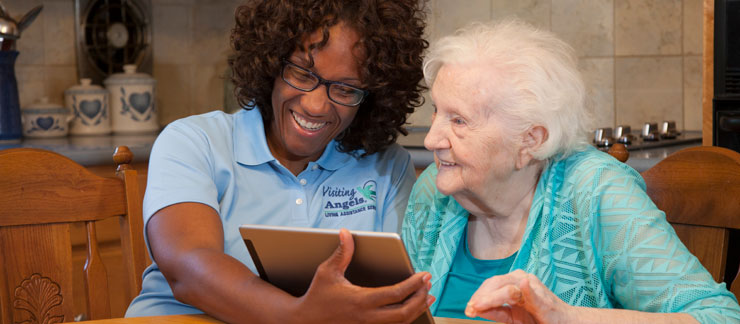
The State of the Art: Caregiving
The world of caregiving has evolved considerably from where it once was. Financial regulations change, technology becomes available to make life easier and certain certifications ensure skills evolve. Being a caregiver is a constant learning experience, and as your loved one’s needs evolve, it’s essential to know how to cater to them.
So, let’s explore the current state of caregiving, everything from financing to the technology available and the certifications you can look for when addressing your senior loved one’s evolving needs.
Financing
What's covered and what's not concerning home care can change, so it's always worth checking what the latest situation is. For an in-depth guide, please see this article: A Guide to Financing Senior Home Care Services.
Medicare
Medicare is the financial program that provides medical benefits to people over 65. In general, Medicare will not pay for long-term in-home care, such as help around the home. It may give some support for short-term conditions or terminal conditions. Your State Health Insurance Assistance Program can provide information relevant to your state.
Medicaid
Medicaid is a joint federal and state program offering medical benefits. Unlike Medicare, it may contribute to long-term in-home care, provided the senior meets eligibility requirements. For more information on eligibility see this guide.
An online guide to applying is available here.
Veterans’ Benefits
These may pay for in-home care if your loved one has served in the armed forces. For more information visit the US Department of Veterans Affairs website.
Health insurance
This usually does not cover in-home care. Long-term care insurance usually will. For more information on that, and other benefits, see our guide to financing in-home care.
Technology
Technology's advances have genuinely simplified the ability to care for an aging loved one who is experiencing increased levels of dependency. Lots of solutions exist to make things like communication and health maintenance easier for people tasked with caring for a loved one.
Video Chat
Services like Skype or FaceTime may be old news, but there’s no discounting the impact they’ve made. The social aspect is attractive, but video chat also lets you pick up on signs you may miss on a phone call. Does Mom look well? Is she happy? Maybe the house looks untidy in the background, and that's out of character. You can tell when Mom needs a visit from family, and when she may need some help with housework. Video chat keeps you connected, so it’s a great idea to ensure your aging loved one has a medium to use it.
Health Monitors
Wearable technology like Fitbit isn’t just for exercise enthusiasts. The latest models take continuous heart rate readings, track the wearer's sleep patterns and can sync the data with a cell phone. They can also be set up to give your loved one a gentle reminder to exercise or, at the opposite side of the spectrum, a reminder not to do too much. They can even provide your loved one’s location via GPS, which can be extremely useful if you’re caring for a loved one who is living with Alzheimer’s or dementia.
Medical Alert Monitors
These monitors allow you to check on your senior’s activity via sensors placed around the home. You receive alerts and can log onto a website to check things like whether your mom is taking pills or opening the refrigerator. These services can be expensive, and usually have a monthly fee and a minimum subscription period. It may be worth considering whether a medical alert subscription is best for your loved one if you’re too distant or busy, or whether an in-person visit from a professional caregiver is a more optimal solution.
A Personal Help Button
The help button is another piece of wearable technology. Your mother would wear the button around her neck, and if she falls, or otherwise needs medical help, she can push the button and be connected to a response center. These also usually require a monthly fee.
Home Assistants
Uber-popular home assistants like Amazon Alexa or Google Home could also revolutionize a senior’s home life. The voice interface makes them easy to interact with, even for technophobes, and you can set up reminder alarms to verbally tell your loved one which medication to take and when. They can make voice calls to other home assistants, without the senior having to physically walk to a phone.
For more information on apps, which can help with things like care planning, medication reminders and caregiver support groups, read this article on the Best Apps and Digital Tools to Help You as a Caregiver.
Caregiver’s Certification
You know what your loved one needs and you want what’s best for her; however, depending on this person’s condition, it may be that a professional caregiver is certified in a direct area in which your loved one is struggling.
There are many general certifications available from agencies like the National Association for Home Care and Hospice as well as more specialized options. If your loved one needs palliative care, then a caregiver who is a Certified Hospice and Palliative Nursing Care Assistant will bring expert care. If your loved one has Alzheimer’s, then someone with an essentiALZ qualification from the Alzheimer’s Association may be best for you.
As the needs of your loved one evolve, so will the type of care required. While you may manage just fine early in the process, you may require professional help as her condition deteriorates. It's essential to assess and reassess your loved one’s needs regularly.
Requirements for professional caregivers vary by state. Some states require them to be licensed and bonded. Some require only that the caregiver has had on-the-job training, some may require some formal training from a vocational school or community college. To find out more about the experience and certification required of caregivers by home care agencies, read more here, or search the requirements in your state.


